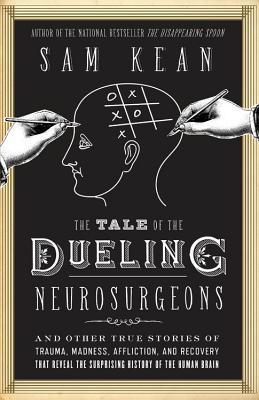The Blurb:
From
the author of the bestseller The Disappearing Spoon, tales of the brain and the history
of neuroscience.
Early studies of the functions of the human brain used a simple method: wait for misfortune to strike-strokes, seizures, infectious diseases, lobotomies, horrendous accidents-and see how the victim coped. In many cases survival was miraculous, and observers could only marvel at the transformations that took place afterward, altering victims' personalities. An injury to one section can leave a person unable to recognize loved ones; some brain trauma can even make you a pathological gambler, pedophile, or liar. But a few scientists realized that these injuries were an opportunity for studying brain function at its extremes. With lucid explanations and incisive wit, Sam Kean explains the brain's secret passageways while recounting forgotten stories of common people whose struggles, resiliency, and deep humanity made modern neuroscience possible.(
Early studies of the functions of the human brain used a simple method: wait for misfortune to strike-strokes, seizures, infectious diseases, lobotomies, horrendous accidents-and see how the victim coped. In many cases survival was miraculous, and observers could only marvel at the transformations that took place afterward, altering victims' personalities. An injury to one section can leave a person unable to recognize loved ones; some brain trauma can even make you a pathological gambler, pedophile, or liar. But a few scientists realized that these injuries were an opportunity for studying brain function at its extremes. With lucid explanations and incisive wit, Sam Kean explains the brain's secret passageways while recounting forgotten stories of common people whose struggles, resiliency, and deep humanity made modern neuroscience possible.(
The Short of it: However you felt reading that
lonnnnnng title? That’s how you’ll feel reading the book. It’s two parts
interesting and one part can-you-hurry-it-up-already.
The Rest of it: For the first 3/4ths of the book I
found it completely fascinating and understandable. The tone is such that
even someone with no knowledge of the brain could easily follow along, and the
parts about how your brain changes (or doesn’t) to accommodate injury and
illness is pretty amazing. The last couple chapters veer more into talking about
the soul and consciousness, and the controversy that happened when researchers
started to pinpoint areas of the brain the controlled specific actions and
emotions and I felt like that part wasn’t quite as well done. This is likely
because of the unscientific nature of the soul itself and so is understandable,
if a bit boring. If I had a complaint about it it would be that I would have
liked to see more of the interesting cases and less of the process of
presenting the work and the background of the scientists themselves. (Tho to be
fair, several of those were fascinating as well.) Overall, quite
interesting and a nice break from my usual reading material.
Source: NetGalley










For the most part, this sounds interesting. I bet my mom would love it!
ReplyDeleteThis does sound interesting. I am not sure I would rush out and get it, but I wouldn't mind reading it at some point.
ReplyDeleteThat does sound interesting but I'm with Kailana. Reading about it doesn't make we want to rush out and get it but if I came across it somewhere I would probably pick it up.
ReplyDeleteSounds like this one might be a good audio choice - then you could tune out when it got to be too much. Definitely sounds like something I would be interested in!
ReplyDelete